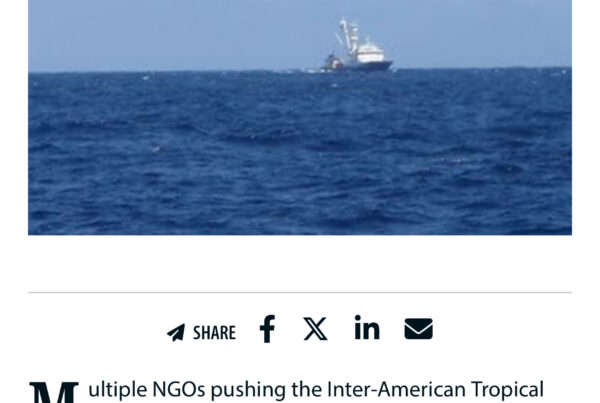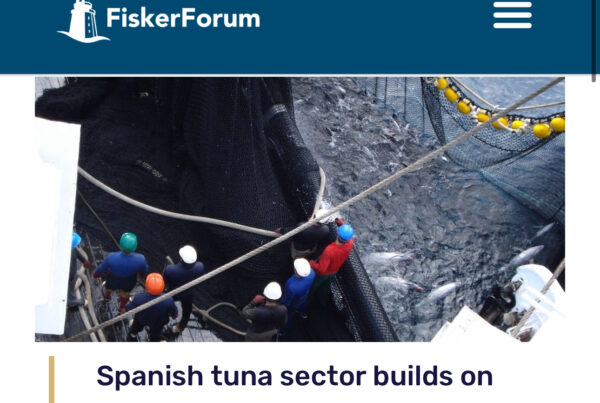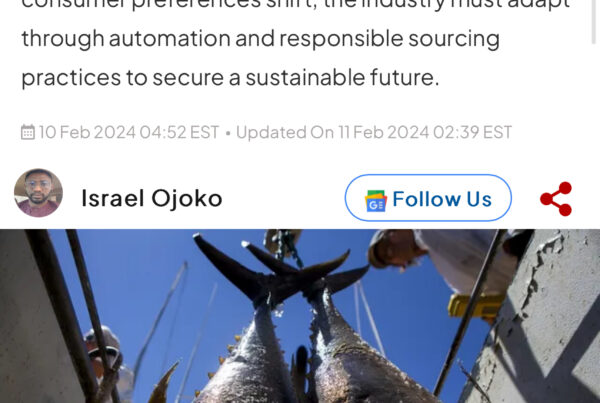Bumble Bee Seafoods CEO to Exit After 12 Years
Canned seafood giant Bumble Bee Seafoods CEO Jan Tharp will be leaving her role after 12 years with the company.
Jerry Chou, the chairman of the Bumble Bee Seafood Company, will assume the position of CEO and is working closely with Tharp on a smooth transition, Bumble Bee told IntraFish.
Tharp led Bumble Bee through a lengthy bankruptcy and subsequent sale of assets to an affiliate of long-time partner, FCF Fishery, a worldwide producer and distributor of seafood products. FCF acquired the company’s North American assets for $928 million (€841.9 million) in 2020. Continue reading here (Source: IntraFish).
Hawaii Gov. Ige Supports Expansion of Pacific Remote Marine National Monument
In conjunction with the signing of four bills to provide better protection of ocean waters around Hawai‘i, Gov. David Ige sent a letter to President Joe Biden expressing his full support for the proposed expansion of the Pacific Remote Islands Marine National Monument.
If approved, the expansion would increase the marine monument from 425,639 to 789,141 square miles, making it the largest marine protected area (MPA) in the world.
“Here in the Pacific, the ocean connects us,” Gov. Ige said. “The Pacific Remote Islands are among the last wild and healthy marine ecosystems in the world, largely because of the lack of human activity. I’m in agreement that the expansion of this marine national monument is politically feasible, culturally supported and builds on the work already done to keep this part of the Pacific Ocean healthy and abundant.” Continue reading here(Source: Maui Now).
Tuna Seiner Sank After Collision, 31 Crew Rescued
Report emerged on a collision between tuna fishing vessels VIVA FAFA NO. 707 and understood, MOAMAEU, in the evening Jun 8, 310 nm east of Rabaul, East New Britain province of Papua New Guinea. According to VIVA FAFA NO. 707 crew testimony, collision was caused by MOAMAEU reckless maneuvering – both ships under way were to pass clear, but suddenly MOAMAEU made sudden turn and was struck amidships by VIVA FAFA NO. 707 bow. MOAMAEU sank, her 31 crew was rescued by VIVA FAFA NO. 707. Continue reading here (Source: Maritime Bulletin).
Coveted MSC Certification Earned by the US Pacific Tuna Group Purse Seine FSC and FAS Set Fishery
The US Pacific Tuna Group and Key Traceability are proud to announce that the US Pacific Tuna Group Purse Seine FSC and FAD Set Fishery has achieved Marine Stewardship Council (MSC) certification. MSC certification is a way of showing that a fishery meets international best practice for sustainable fishing. Fish and seafood from the certified US Pacific Tuna Group Purse Seine FSC and FAD Set Fishery can now carry the globally-recognized blue MSC label, assuring customers that what they’re buying is sustainable. The independent certification assessment was conducted by SCS Global Services, one of the world’s leading third-party certifiers.
The US Pacific Tuna Group is a commercial fishing operation of seven vessels, targeting Eastern and Western Central Pacific skipjack, yellowfin, and bigeye tuna, harvested by purse seine, both free school and on fish aggregating devices (FADs). The group operates primarily in the Western Central Pacific Ocean (WCPO) and some of the vessels seasonally operate in the Eastern Central Pacific Ocean (EPO). All of the vessels are listed on both the Western and Central Pacific Fisheries Commission (WCPFC) and Inter-American Tropical Tuna Commission (IATTC) Regional Vessel Registers. Continue reading here (Source: Yahoo!).
Indonesian Suppliers Turning to China Amid Increased US Focus on IUU, Labor Abuse
The United States is at risk of losing its Asian seafood supply to Chinese buyers due to overly stringent import controls, according to Jerry Knecht, the founder of Portland, Maine, U.S.A.-based North Atlantic Incorporated.
Knecht, who sold North Atlantic Inc. to Slade Gorton in August 2021, now lives in Bali, Indonesia, where he formerly operated P.T. Bali Seafood International until selling his stake in the company in March 2021. Knecht was a 2018 finalist for the Seafood Champion Award for Innovation for his efforts to improve worker rights in Indonesia, including the introduction of a worker empowerment initiative. Continue reading here(Source: SeafoodSource).
Japan’s Latest Whitepaper Highlights Another Drop In Seafood Consumption
Japan’s Fisheries Agency recently released its annual Fisheries Whitepaper examining the country’s seafood trends in 2021 – while also setting new policies for 2022.
The whitepaper covers a huge range of data on the seafood industry in Japan from 2021, and also includes new data from 2020 that was previously unavailable.
The whitepaper shows that per-capita consumption of seafood in Japan has dropped over the past two decades. In 2001, per-capita consumption was 40.2 kilograms, but it has since steadily has declined – falling below per-capita consumption of meat in 2011. In 2020, per-capita consumption fell to 23.4 kilograms, which the whitepaper attributes to consumers being deterred from buying seafood by high prices and the labor involved in cooking. Continue reading here (Source: SeafoodSource).
High Seas Treaty on Allocating Fish Across Jurisdictions
On Dec. 24, 2017, the UN General Assembly voted to convene a multi-year process to develop a treaty on the conservation and sustainable use of marine biological diversity, now referred to as the Treaty on Biodiversity in Areas Beyond National Jurisdiction (BBNJ Treaty), also known as the Treaty on the High Seas. Currently still in negotiation at the UN, the draft addresses four key areas: 1) marine genetic resources; 2) area-based management tools including marine protected areas; 3) environmental impact assessments and capacity building; and 4) transfer of marine technology.
Why is an international treaty for the high seas crucial to biodiversity?
The high seas are largely unexplored, vastly deep areas teeming with marine life and are known to be a murky and a complex topic to tackle. Only 10 percent are currently protected and, due to a lack of clear rules and effective enforcement as well as persistent government gaps, the high seas are notoriously difficult to manage and often subject to legal questions. Continue reading here (Source: The Manila Times).
First Female Crew Set Course for Pacific Fishing Industry
Opening career pathways and providing equal opportunities for women is the focus of a world-first initiative that sees an all-female deck crew set off on their first fishing trip on a tuna longline vessel, today.
The collaboration between SeaQuest Fiji and the Pacific Islands Forum Fisheries Agency seeks to begin addressing some of the issues creating the sizable gender imbalance in the Pacific tuna industry.
Pacific Islands Forum Fisheries Agency Director General, Dr Manu Tupou-Roosen said the women on this crew were pioneers, charting a new direction for the Pacific and the world by challenging the status quo. Continue reading here (Source: Solomon Times).



